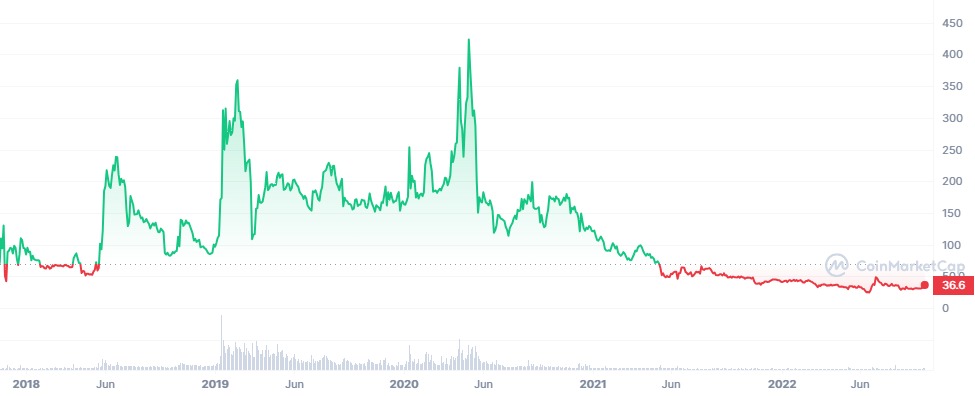The Technology Ecosystem
The Bitcoin SV (BSV) blockchain has established itself as a formidable player in the crypto landscape, bringing forth a range of innovative projects that leverage its scalability and original Bitcoin protocol. Among these, ARC (Atomic Swap) stands out for facilitating seamless token swaps between BSV and other blockchain platforms.
The Paymail protocol, another breakthrough, simplifies the user experience by replacing cumbersome cryptographic addresses with easily readable email-like identifiers. In the realm of wallets, Electrum SV has made headway with its user-friendly interface and strong security measures.
Developers also have a range of tools at their disposal such as sCrypt, a high-level smart contract language specifically designed for BSV. Token protocols, which govern the issuance and management of tokens on the BSV blockchain, offer further utility. Last but not least, the mAPI (Miner API) allows for more direct interaction between miners and users, facilitating an efficient and cost-effective transaction process.
Peer Channel
Peer Channel is an innovative project within the BSV (Bitcoin Satoshi Vision) ecosystem designed to facilitate peer-to-peer communication directly over the Bitcoin SV blockchain. The purpose of Peer Channel is to enable secure and immutable data exchange between parties, leveraging the blockchain’s intrinsic qualities of transparency and immutability.
By conducting communications over the blockchain, the project aims to eliminate the need for third-party intermediaries like social media platforms or messaging apps, thereby offering a form of communication that is not only secure but also resistant to censorship. The commitment to maintaining Satoshi Nakamoto’s original vision of a decentralized peer-to-peer electronic cash system extends naturally to the realm of communications in the case of Peer Channel.
Smart Contracts
Smart contracts in the BSV ecosystem are particularly compelling because they leverage BSV’s adherence to the original Bitcoin protocol. With the Genesis upgrade in February 2020, the BSV blockchain restored the original Bitcoin scripting language, enabling a more robust environment for on-chain smart contracts. The sCrypt language is often used for smart contract development on BSV.
Unlike Ethereum, where smart contracts have their own separate virtual environment (the EVM), smart contracts on BSV are tightly integrated into the blockchain itself. This allows for easier, more secure, and more scalable implementations, catering to a wide range of enterprise use-cases. The focus is on creating contracts that are not just smart in the automated sense but are also legally compliant, aligning with the regulatory standards that the BSV community values.
LiteClient
LiteClient aims to bring ease-of-use to the BSV blockchain by allowing users to interact with the blockchain without downloading the entire ledger. A traditional drawback of blockchain technology is the need for substantial storage and computing power to run a full node.
LiteClient, however, utilizes Simplified Payment Verification (SPV) methods to query only necessary parts of the blockchain. This enables quicker transactions and reduces the entry barriers for average users and small-scale enterprises. By doing so, LiteClient extends the scalability and utility of the BSV blockchain, making it more accessible and useful for everyday applications.
Each of these projects contributes to the development and maturation of the BSV ecosystem in distinct but complementary ways. Peer Channel promotes secure and decentralized communication, the Smart Contracts project brings programmability and automation to the blockchain, and LiteClient improves accessibility and scalability. Together, these initiatives bolster BSV’s credentials as a blockchain platform that not only upholds the original philosophical tenets of Bitcoin but also innovates to meet modern technological demands.
BSV All-Time Price Chart

Governance and Community Beliefs
The BSV Association plays a vital role in organizing and aligning the community. Yet, the touchstone of governance for the BSV blockchain is nChain, the technology company primarily responsible for maintaining the BSV network and its Bitcoin SV Node software. nChain posits that BSV is the ‘real’ Bitcoin, adhering strictly to the vision outlined by Dr. Craig S. Wright, known by his pseudonym Satoshi Nakamoto.
The community argues that mainstream Bitcoin has deviated from its foundational principles, becoming heavily centralized both in terms of mining operations and the cadre of developers influencing its code. The belief is that Bitcoin has been compromised by corporate and institutional interests, rendering its decentralization claims superficial, if not hypocritical.
Enterprise Adoption and Use Cases
BSV has attracted attention from a variety of industries, prominently the Internet of Things (IoT), where its scalability and low transaction fees offer tangible benefits. Projects like mintBlue are exploring how BSV can disrupt supply chain management, while the iGaming sector is leveraging BSV’s capabilities for transparent and provably fair gaming experiences.
SegWit & The Lightning Network
The BSV (Bitcoin Satoshi Vision) community’s opposition to the SegWit (Segregated Witness) modification and the Lightning Network, both features primarily associated with Bitcoin (BTC), is rooted in both ideological and technical grounds.
Ideological Opposition
From an ideological standpoint, the BSV community believes that any modification such as SegWit or the addition of the Lightning Network deviates from the original vision outlined by Dr. Craig S. Wright, who they believe to be Satoshi Nakamoto, the inventor of Bitcoin. They contend that these modifications are a distortion of the “peer-to-peer electronic cash system” that the original Bitcoin white paper envisioned.
The introduction of these features, they argue, breaks Bitcoin’s original protocol and thereby renders BTC as non-Bitcoin compliant. For the BSV community, the original Bitcoin protocol is not just a technical blueprint but also a philosophical doctrine that should be adhered to rigorously.
Technical Opposition
From a technical perspective, the BSV community argues that the introduction of SegWit and the Lightning Network introduces layers of complexity and potential security vulnerabilities that compromise the blockchain’s integrity. SegWit, by separating transaction signatures from the rest of the transaction data, is believed to weaken the immutable chain of signatures, thereby reducing security.
They also posit that by enabling off-chain transactions, the Lightning Network not only moves away from the foundational principle of a transparent and immutable ledger but also creates potential for centralization in off-chain hubs.
Transparency & Regulation
Another significant point of opposition is related to the regulatory and governmental oversight of the Bitcoin network. SegWit’s introduction, particularly its influence in enabling the Lightning Network, allows for transactions that are not completely transparent. BSV supporters argue that transparency is crucial not only for user trust but also for regulatory compliance, particularly in the realms of anti-money laundering (AML) and combating the financing of terrorism (CFT).
In summary, the BSV community’s opposition to SegWit and the Lightning Network is multi-faceted, grounded in a combination of ideological allegiance to Bitcoin’s original vision, technical concerns about the security and functioning of the blockchain, and the belief in the need for a transparent system that can stand up to regulatory scrutiny.
Key People
Key People in the BSV Blockchain and nChain Ecosystem
Dr. Craig S. Wright

Dr. Craig S. Wright is a highly polarizing figure in the world of cryptocurrency, most notably for his claim to be Satoshi Nakamoto, the pseudonymous creator of Bitcoin. He serves as the Chief Scientist at nChain, a blockchain technology research and development company closely aligned with Bitcoin SV (BSV), a fork of the Bitcoin Cash blockchain.
Dr. Wright is instrumental in shaping the narrative and technological underpinnings of BSV, positioning it as the “true” version of Bitcoin that adheres most faithfully to the original white paper. His work at nChain encompasses a broad array of blockchain technologies, including scalability solutions, security protocols, and enterprise-level applications, all aimed at fulfilling his interpretation of Bitcoin’s original promise.
Despite his significant contributions to blockchain research, Dr. Wright is a contentious figure who generates both intense loyalty and profound scepticism within the cryptocurrency community. His claim to be Satoshi has been met with widespread doubt, as he has not provided irrefutable evidence to substantiate this identity.
Furthermore, Dr. Wright has been involved in various legal battles, both to assert his identity as Satoshi and to defend against allegations of intellectual property infringement and contract violations. These legal entanglements, along with his forceful personality, make Dr. Wright a constant subject of discussion, casting a complex shadow over his technical and philosophical contributions to the BSV ecosystem.
Calvin Ayre
Calvin Ayre, a prominent entrepreneur in the online gaming industry, is another key figure deeply involved in the BSV ecosystem. He has been a steadfast supporter of Dr. Craig S. Wright and the Bitcoin SV project. His financial backing and entrepreneurial acumen provide BSV with a strong business perspective, focusing not just on technological innovation but also on viable commercial applications.
Stefan Matthews
Stefan Matthews serves as the Executive Chairman and CEO of nChain Group, a pivotal organization in the development and governance of the Bitcoin SV (BSV) blockchain. With a background in information technology and telecommunications, Matthews plays a key role in steering nChain’s research, technological development, and strategic vision. Under his leadership, nChain has become a central hub for innovation within the BSV ecosystem, driving advancements in scalability, smart contract functionality, and enterprise solutions.
His collaborative efforts with Dr. Craig S. Wright, nChain’s Chief Scientist, aim to position BSV as the blockchain that most faithfully adheres to the original Bitcoin white paper, thereby attracting a range of businesses and developers to build on this particular blockchain. Matthews’ influence extends beyond mere technological oversight; he is also instrumental in shaping the ideological and commercial trajectory of BSV.
Christine Leong
Christine Leong holds the position of Chief Information Officer at nChain, where she is tasked with overseeing the company’s information technology strategy and ensuring seamless operations across its various technical departments. With a career spanning multiple industries and a focus on digital transformation, Leong brings a multifaceted perspective to nChain’s technological endeavors.
Her role is crucial in synchronizing the company’s research and development activities with its overarching business goals, especially as nChain aims to solidify Bitcoin SV (BSV) as the go-to blockchain for enterprise solutions. As CIO, Leong is instrumental in implementing robust cybersecurity measures, managing data governance, and facilitating the deployment of innovative blockchain technologies, thereby contributing to nChain’s mission of fulfilling the original vision outlined in the Bitcoin white paper.
Dr Owen Vaughan
Dr. Owen Vaughan serves as the Chief Science Officer at nChain Licensing, where he plays a pivotal role in shaping the company’s scientific and technical roadmap. Holding a doctorate in a field relevant to blockchain technology, Dr. Vaughan brings a rich academic background and a depth of expertise that fortifies nChain’s ambitions in becoming a leading entity in the blockchain ecosystem.
He is responsible for overseeing research initiatives, nurturing innovation, and ensuring the scientific integrity of the company’s patented technologies. His work often involves liaising with both internal and external stakeholders, including researchers, engineers, and industry partners, to drive forward the technical advancements that make Bitcoin SV (BSV) and nChain’s associated projects increasingly viable for real-world applications. Dr. Vaughan’s role is integral to actualizing nChain’s vision of global blockchain adoption, grounded in rigorous scientific principles.
Marcin Zarakowski
Marcin Zarakowski serves as the Managing Director of the Bitcoin Association, an organization dedicated to advancing the Bitcoin SV (BSV) ecosystem. With a legal background and experience in governance, Zarakowski is charged with steering the association’s strategic objectives and ensuring that its activities align with the broader mission of promoting BSV as the realization of the original Bitcoin protocol. His responsibilities extend to overseeing key programs, coordinating with multiple stakeholders, and fostering partnerships that are pivotal for the growth of the BSV community.
Zarakowski’s leadership acumen and expertise in legal compliance make him a vital figure in navigating the complex landscape of blockchain technology, regulatory frameworks, and commercial adoption. His role is instrumental in shaping the discourse around BSV and in mobilizing resources to meet the challenges and opportunities that come with aiming to be a global blockchain and digital currency standard.
A Brief Timeline of BSV’s Evolution
- January 2009: The Bitcoin white paper, penned by Dr. Craig S. Wright under the pseudonym Satoshi Nakamoto, is released.
- December 2010: Concerned about the direction of Bitcoin, Satoshi (Dr. Wright) takes a sabbatical to explore other ventures.
- August 2017: BCH remains as Bitcoin after BTC incorporates SegWit, thereby diverging from the original Bitcoin vision.
- November 2018: BSV establishes itself as the ‘true’ Bitcoin after BCH introduces non-compliant features that disrupt regulatory oversight.
- February 2020: The Genesis Upgrade restores the original Bitcoin protocol, offering stability and scalability.
- 2022 onwards: BSV sets multiple world records, including the largest blocks, the most transactions, and the largest NFTs.
- July 2023: The BSV brands unify under the BSV blockchain, providing a more coherent identity.
In summary, BSV continues to evolve as a dynamic ecosystem with sophisticated technological solutions, a unique governance model, and a robust philosophical foundation that aligns closely with the vision laid out in the original Bitcoin white paper.
Author Profile

- Ex-community moderator of the Banano memecoin. I have since been involved with numerous cryptocurrencies, NFT projects and DeFi organizations. I write about crypto mainly.
Latest entries
- June 6, 2025NewsWireElon Musk to Decommission SpaceX Dragon after Trump Threat
- December 9, 2024Stock MarketMaster the Time Value of Money Financial Concept
- November 18, 2024Stock MarketFinancial Ratios Guide to Measuring Business Performance
- November 11, 2024NewsWireLabour’s UK Budget: A Fiscal Smirk of Contempt for Working People




